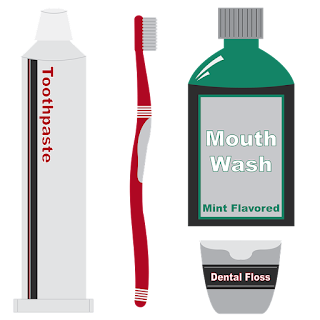Which Ingredients Make Mouthwash Such Effective?
These are the 6 ingredients that makes mouthwash Such effective.
 |
| Mouthwash |
It is important for mouthwash that they develop their effect solely by the contact of the liquid with teeth and gums. The most important are five functions:
Functions Of Mouthwash
- Control of bacteria that cause gum infections, caries and mouth odor.
- Remineralization of the molten tooth, prevention of demineralization, caries prophylaxis.
- Removal of calculus or diminish its new formation.
- Desensitization of sensitive teeth.
- Prevent and reduce tooth decolorization.
- The substances which the producers use for these purposes are generally the same and differ only in the concentration:
Mouthwash Ingredients
Below are 6 major ingredients of mouthwash that makes it more effective.1. FLUORIDES
 |
| fluoride |
Toothbrush
fluoride is included in some toothpaste and foods.
Fluoride reduces the acid production of bacteria , which is responsible for demineralization, and thus the degradation of the tooth enamel. It also deposits on the tooth surfaces, so the positive effect lasts longer. The fluoride ions released over time provide the improved reintroduction of calcium and phosphate into the molten tooth, which is partly regenerated.
The main reason of using fluoride with mouthwash is prevention of dental caries.At least 200 milligrams per kilogram (0.02 percent) of fluoride should be included in mouthwash.
However, fluoride is not a completely harmless active ingredient. Too high concentration results in a contrary effect: It weakens the teeth and makes the bones rotten. As fluoride usually is included in food and toothpaste,It should be based on the recommendation of the ADA , the concentration of fluordie in mouthwashes must not exceed than 500 milligrams per kilogram (0.05 percent) .
2. CHLORHEXIDINE DIGLUCONATE
 |
| chlorhexidine digluconate |
With regard to the action against bacteria, there is currently no better agent than chlorhexidine. It is in high concentration in dentistry as a so-called gold standard , on which the effectiveness of all products is measured.
Chlorhexidine penetrates into the bacteria and decomposes them. Because of its very good adhesion properties, it also lasts long in the oral cavity, which keeps the effect longer. Since bacteria are responsible for most dental and oral diseases, chlorhexidine helps for plaque, gingivitis and bad breath .
Unfortunately, chlorhexidine is not without drawbacks that can occur with regular use: The waste products of killed bacteria combine with constituents of saliva and sit down as brownish discoloration on the surface of the teeth from. They can be removed by thorough brushing, but in some cases a professional cleaning of the teeth may also be necessary. A second disadvantage is the effect of chlorhexidine on the sense of taste that decreases or possibly changed.
Doctor
The dentist can remove some deposits only by professionally cleaning.
Ingredients in toothpastes prevent the unrestricted function of chlorhexidine. Therefore you should use chlorhexidine mouthwash after an hour of brushing your teeth.
Among the tested products there is only one toothpaste that do not influence on the antibacterial action of chlorhexidine and that is CURASEPT toothpaste. It contains ascorbic acid and sulfites that counteract the side effects. They bind the waste products of bacterial decomposition before they settle on the teeth. They have no significant influence on the antibacterial action of chlorhexidine. However, the plaque control is somewhat diminished.
3. CETYLPYRIDINIUM CHLORIDE
 |
| cetylpyridinium chloride |
Also cetylpyridinium is included in mouthwashes because of its antiseptic properties. Already saliva is, however, able to wash out the active substance. It is weaker than chlorhexidine and has no long-term effect . Side effects can occur as stomach discomfort and nausea.
4. ZINC CHLORIDE
 |
| zinc chloride |
Pregnant
Some oral rinse solutions contain alcohol, which is not recommended especially for pregnant women and children.
When zinc chloride is present in an oral rinse, than it becomes effective against tartar . The active ingredient inhibits the deposition of calcium phosphate in the dental plaque and displaces already stored.
However, the calculus, which still forms, is comparatively soft under the influence of zinc chloride. As it is thus more difficult to adhere to the tooth surface,It can be removed through brushing of the teeth. LISTERINE TOTAL CARE contains zinc chloride so it is advisable to use it.
5. ESSENTIAL OILS
 |
| essential oils |
Some products contain the anti-bacterial and anti-inflammatory effect of the essential oils that includes eucalyptol, methyl salicylate, thymol and menthol.
The methyl salicylate has been controversially discussed for some time. its use in the oral cavity is critically examined.
6. ALCOHOL
To solve essential oils and other substances in the liquid, some preparations have included alcohol.
Its use is not completely harmless, although it can reach the bloodstream at most in small amounts when in contact with the oral mucosa.
Nevertheless, children and pregnant women are advised not to use . In addition, in the low concentration in which the alcohol is present, it has no relevant disinfecting effect.











No comments: